Behind the curtains of Sinhala theatre
Chalaka Ranasooriya is definitely one of the bywords in the new Sinhala theatre, having garnered more than his fair share of laurels at state drama festivals. His plays, he describes as having ‘comedic features’, but always ending with ‘day-to-day’ tragedies.
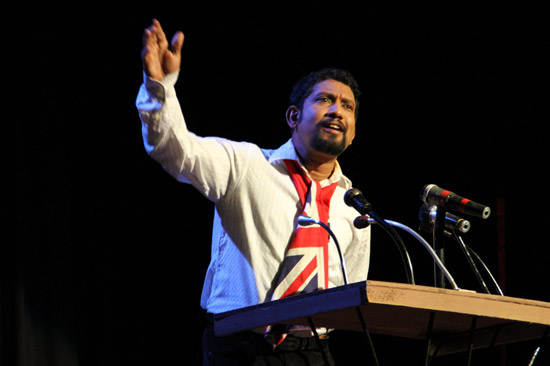

Udayasiri Wickremeratne and scenes from Suddek Oba Amathayi (above) and Harima Badu Thunak (right)
Contrary to popular belief, Chalaka thinks that the leading man and influence of modern Sinhala theatre is Dayananda Gunewardene rather than Sarachchandra.
Box, one of the first local plays to follow box theatre, was Chalaka’s first hit and was based on the 1966 film Parasathu Mal. Only Bonny Mahatteya the playboy from the walawwa (some may remember the classic stills of Gamini Fonseka on a grand staircase) is a good guy in the play where a maverick conversation between a middle class man and a streetwalker is the crux. Box won seven awards at the State Drama Festival including best script and best direction.
Chalaka will always have a soft spot for Maaraka Linde Sawaariyak, his 2016 play which shoots off Gamperaliya, the classic Sinhala novel by Martin Wickremesinghe, and its two sequels Kaliyugaya and Yuganthaya. While the literary trilogy ends by the 1940s, Chalaka in the drama pushes the action up to 2025. Using time-travelling, it looks at how those characters from a Victorian Ceylon in the Southern coast have evolved to live in our day and age.
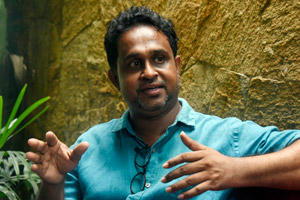
Chalaka Ranasooriya (pic by Akila Jayawardena) and below, a scene from Sanduda Wetenne Sikuradata
The play won the best script, best supporting actor and best stage backdrop in the 2016 State Drama Festival.
Chalaka’s ultimate coup is Sanduda Wetenne Sikuradata (Monday falls on Friday), which scooped the best script, direction, actor and actress in the State Drama Festival in 2022. Though inspired by Ray Cooney-style farce, it atypically ends in tragedy.
While Chalaka doesn’t exactly aim to forge a new heaven and new earth, he keeps the audience in mind and strives to work changes in the psyche of the individual viewer. He laments that while there is a small pocket of young thespians geared for maverick change they don’t get much attention. A brilliant recent direction he cites is S. I. Samarakkodi’s Love and Life, a play sans-speech where all communication happens through mime. Also, when plays venture out of Colombo, audiences tend to get thinner, he laments.
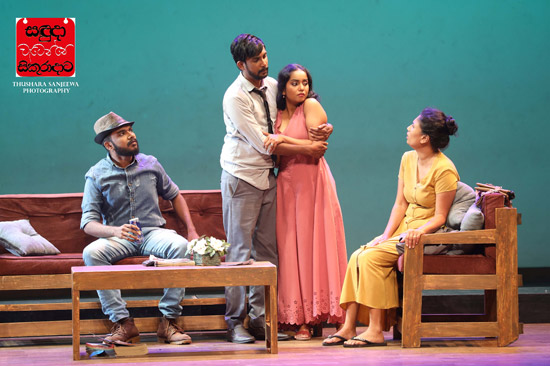 He believes that, with very few Bohemian theatres existing here like the ‘Mahalwarawa Bakery’, there’s space for more radical stagecraft.
He believes that, with very few Bohemian theatres existing here like the ‘Mahalwarawa Bakery’, there’s space for more radical stagecraft.
One of the most talked-of thespians of recent times with a masterful knack for the catchy phrase, Udayasiri Wickremeratne daylights as an ad copywriter. Art should bring humanity together, says Udayasiri with a smile, “like Jothipala’s songs.” His aim, as a thespian, is not so much to create change as “to preserve humanity and its legacy” and eradicate the negative trends.
His most original play was Suddek Oba Amathayi, which he deems a “successful experiment”. It took the form of three speeches – one a valediction of our colonial rulers (suddas) by a toddy-swilling villager in a fancy suit, another on our history by a historian and another by a woman – where the speakers convey much more than they do in words and the conversation unravels from historical narratives to gender and imperialism.
Equally ‘turn-the-tables’ was Rangapem Iwarayi (The Acting’s Over) where the coy Sabakolayaa (stage-fright, personified) is pushed to the centre stage and proceeds to wreak havoc as he can’t “lie without a blush”(and in his case also has an array of disastrous give-away spasms).
In Pem Yuwalak Onekara Thibe, a film director in a fit of zeal decides to star two real-life (amateur) lovers in a film. The play features the ensuing chaos where reality locks horns with the scripted romance.
Udayasiri’s most popular hit however, would be Garu Katana-yakathumani, which satirizes the entire parliament, optimizing on the humorous element which is never lacking in local politics- from gaffes to sexual proclivities.
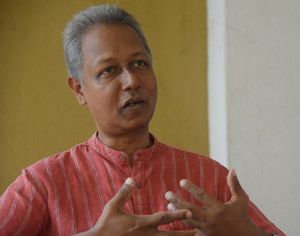
Rajitha Disanayake and below, a scene from Nethuwa Beri Minihek
Harima Badu Thunak, his latest play, features three drunken men. It was a tightrope act, says Udayasiri, in that he wanted to bring down the limits of sober, polite society, yet, obviously, had to observe the inevitable limits of the proscenium theatre in particular and art in general, dispensing of which would be too radical.
“The wonderful thing about drama,” muses Udayasiri, is that “it’s not just me and my words but the actors put in so much especially during rehearsals,” though there’s a downside to this as well.
“It’s not applause that we value most but constructive criticism,” he says, adding he doesn’t really care for what professional critics say, “because they only review what they can understand.”
Veteran Rajitha Disanayake is a name in currency amongst drama circles, counting as he does 30 years at the Wendt come January next year. His perennial success, he attributes in part to the fact that the English audiences patronize his plays, and English thespians too have crossed over (Gihan de Chickera, Pasan Ranaweera, Bimsara Premaratne and Charinda Chandrasena to name but a few).
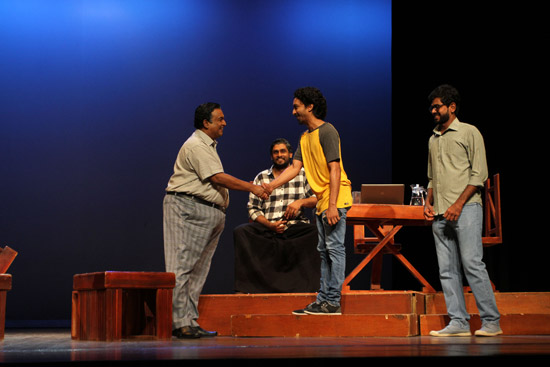 His first play done as an undergraduate was Sakwadawala (1995) and focused on an issue then close at hand to his peers- the societal pressures on youths to have the triumvirate of ‘a job, a house and a vehicle’ before marriage and founding a family.
His first play done as an undergraduate was Sakwadawala (1995) and focused on an issue then close at hand to his peers- the societal pressures on youths to have the triumvirate of ‘a job, a house and a vehicle’ before marriage and founding a family.
Hansayintath Man Aasai (I Love Swans Too) portrayed two undergraduates living together who open their world to two other lovers.
The much-vaunted Weeraya Merila (The Hero’s Dead- his first play to exceed 100 shows) dealt with the extravagant hype media created about the new millennium (2000) approaching, focusing on the grip of consumerism and how man has been forced to be an isolated unit rather than a social animal- bent on achieving.
Sihina Horu Aran, another classic, delved into the material dreams and aspirations of modern man while Aapahu Herenna Be (No Turning Back) was about the fictionalizing of the war that happened in 2008. There was a twist in that a character who opposes the fictionalizing finds he himself has to cover up his own private life.
Nethuwa Beri Minihek, set against the first few months of the Yahapalana government, depicted a young man trying to reclaim lost political power and a girl in search of maternal affection.
The political is ever-present as in Bakamuna Weedi Basee (The Owl Walks Abroad) where he dramatized the post-war euphoria being used for political ends.
Rajitha’s awards are too many to enumerate, having bagged the best drama at the State Festival alone at least four times.
Rajitha thinks that the strength of the Sinhala theatre of his generation, is in the embracing of contemporary life and abandoning the overacting (adhi-rangana) of the pre-90s era.
But audiences having changed drastically over his three decades, Rajitha says, and today the stage has to compete with so many new entertainment modes. “The whole country no longer waits with bated breath for the same cricket match or teledrama, but it’s the responsibility of the dramatist to make such a community mull over their lives, human relationships and society.”
“If the lives we portray in our plays can resonate with audiences, they will connect more with the play.”
Rajitha incidentally is to fly soon to Melbourne, Sydney and Perth with Nethuwa Beri Minihek.
Asked about the hallmarks of good theatre, Rajitha says that, apart from being relatable, a good play should “make us ponder society, life and human nature.”
“Also, the presentation – fresh techniques and new moulds are important. We should always be on the lookout for fresh research and techniques, then only would we be able to address wider audiences than we do now.”
Searching for an ideal partner? Find your soul mate on Hitad.lk, Sri Lanka's favourite marriage proposals page. With Hitad.lk matrimonial advertisements you have access to thousands of ads from potential suitors who are looking for someone just like you.


